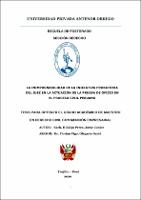| dc.contributor.advisor | Florián Vigo, Olegario David | |
| dc.contributor.author | Hidalgo Perea, Jorge Junior | |
| dc.creator | Hidalgo Perea, Jorge Junior | |
| dc.date.accessioned | 2021-02-12T14:39:03Z | |
| dc.date.available | 2021-02-12T14:39:03Z | |
| dc.date.issued | 2021 | |
| dc.identifier.uri | https://hdl.handle.net/20.500.12759/7221 | |
| dc.description.abstract | La presente Tesis titulada “La inimpugnabilidad de la iniciativa probatoria del
juez en la actuación de la prueba de oficio en el proceso civil peruano”, se
orienta a determinar cuáles son los fundamentos jurídicos por el cual las partes
podrían impugnar la iniciativa probatoria del juez en la actuación de la prueba de
oficio en el marco del proceso civil peruano.
Para tales efectos formulamos la siguiente interrogante ¿CÚALES SON LOS
FUNDAMENTOS JURÍDICOS POR LOS CUALES LAS PARTES PODRIAN
IMPUGNAR LA INICIATIVA PROBATORIA DEL JUEZ EN LA ACTUACIÓN DE
LA PRUEBA DE OFICIO EN EL PROCESO CIVIL PERUANO?; en este orden
de ideas concebimos los siguientes objetivos: Conocer la regulación normativa
de la prueba y de la iniciativa probatoria del juez en la actuación de la prueba de
oficio; Investigar los aspectos generales de la Pluralidad de instancia y los
presupuestos y características entorno a la Teoría General de la Impugnación;
Investigar los fundamentos constitucionales de la motivación de las resoluciones
judiciales; y analizar a nivel de la legislación comparada los diversos
ordenamientos que regulan la actividad probatoria del juez en la actuación de la
prueba de oficio, para así poder compararlo con la legislación nacional.
Aplicando diversos métodos concluimos que los fundamentos jurídicos por los
cuales las partes inmersas en un proceso de carácter civil pueden impugnar la
iniciativa probatoria del juez en la actuación de la prueba de oficio, se basan en
el derecho constitucional a la pluralidad de instancia, la insuficiente motivación
de la resolución que la ordena y el derecho de defensa, en el marco del proceso
civil peruano. De igual forma, se concluyó que la regulación jurídica de la
iniciativa probatoria del juez en la actuación de la prueba de oficio a nivel de
nuestro ordenamiento procesal civil es limitativa en la medida que no desarrolla
los diversos supuestos de impugnabilidad que corresponden a las partes en un
contexto procesal si consideran una afectación a sus intereses, a pesar de un
marco constitucional aplicable, los razonamientos jurídicos de la especialidad y
la legislación comparada. | es_PE |
| dc.description.abstract | The Thesis ““The impregnability of the probative initiative of the judge in the
performance of the ex officio test in the Peruvian civil process““, is aimed at
determining what are the legal foundations by which the parties could challenge
the probative initiative of the judge in the performance of the ex officio test in the
framework of the Peruvian civil process.
In this sense, the cuestion is: WHAT ARE THE LEGAL BASES FOR WHICH
THE PARTIES COULD IMPUTE THE JUDGE'S PROBATORY INITIATIVE IN
THE PERFORMANCE OF THE OFFICIAL TEST IN THE PERUVIAN CIVIL
PROCESS?, against which We set ourselves the following main objectives: To
know the normative regulation of the test and the probative initiative of the judge
in the performance of the ex officio test; Investigate the general aspects of
instance Plurality and the budgets and characteristics surrounding the General
Theory of the Challenge; Investigate the constitutional foundations of the
motivation of judicial decisions; and analyze at the level of comparative legislation
the various regulations that regulate the probationary activity of the judge in the
performance of the ex officio test, in order to compare it with national legislation.
In application of the various logical and legal methods, it was concluded that the
legal foundations by which the parties involved in a civil process can challenge
the probative initiative of the judge in the performance of the ex officio evidence,
are based on the law constitutional to the plurality of instance, the insufficient
motivation of the resolution that orders it and the right of defense, within the
framework of the Peruvian civil process. Likewise, it was concluded that the legal
regulation of the probationary initiative of the judge in the performance of the ex
officio test at the level of our civil procedural order is limiting in so far as it does
not develop the various cases of challenge that correspond to the parties in a
procedural context if they consider an affectation to their interests, in spite of an
applicable constitutional framework, the legal reasoning of the specialty and the
comparative legislation. | en_US |
| dc.description.uri | Tesis | es_PE |
| dc.format | application/pdf | es_PE |
| dc.language.iso | spa | es_PE |
| dc.publisher | Universidad Privada Antenor Orrego | es_PE |
| dc.relation.ispartofseries | M_DERE_135 | |
| dc.rights | info:eu-repo/semantics/openAccess | es_PE |
| dc.rights.uri | https://creativecommons.org/licenses/by/4.0/ | es_PE |
| dc.source | Universidad Privada Antenor Orrego | es_PE |
| dc.source | Repositorio Institucional - UPAO | es_PE |
| dc.subject | Probatoria | es_PE |
| dc.subject | Prueba | es_PE |
| dc.title | La inimpugnabilidad de la iniciativa probatoria del juez en la actuación de la prueba de oficio en el proceso civil peruano | es_PE |
| dc.type | info:eu-repo/semantics/masterThesis | es_PE |
| thesis.degree.level | Maestría | es_PE |
| thesis.degree.grantor | Universidad Privada Antenor Orrego. Escuela de Postgrado | es_PE |
| thesis.degree.name | Maestro en Derecho con Mención en Derecho Civil y Empresarial | es_PE |
| thesis.degree.discipline | Maestría en Derecho | es_PE |
| dc.subject.ocde | https://purl.org/pe-repo/ocde/ford#5.05.01 | es_PE |
| renati.type | https://purl.org/pe-repo/renati/type#tesis | es_PE |
| renati.level | https://purl.org/pe-repo/renati/level#maestro | es_PE |
| renati.discipline | 422077 | es_PE |
| dc.publisher.country | PE | es_PE |


